Hello World
Erika Mesh , 8/8/2025
Welcome
Whether this is your first time visiting the echoes website or you're already part of the echoes community, welcome to our new blog. The team and I will use this to share the backstory behind various accomplishments, events, etc. For this first post, I'd like to reflect on the past year. I promise future posts won’t be so long & will be more focused on specific topics. A year is just a lot to cover, and it makes more sense to reflect on it all at once.
Getting Started
echoes began as what we fondly refer to as my "half-baked idea." I wanted to capture the sense of community I'd seen in students working on Changeling, the self-growth I'd seen in my IGME-601 students, and the connection and emotion I'd felt in poetry readings with my mother as a kid. It's an idea I'd been tossing around for a while, but it never quite took shape. I kept getting stuck on how to make it happen in a sustainable way. I had no funding & didn't want students trying to fit this in for free on top of coursework. I also knew the "slow roll" production flow I wanted wasn't possible with constantly changing cohorts of "entrepreneurial co-op" students. In essence, the idea was too big to launch as a side effort and too small for existing course credit options.
At this point, I happened to attend a breakfast with Joe Geigel, who was helping to launch VIPs @ RIT. Amongst its many benefits, the VIP structure solved a crucial problem: by providing variable course credit, students can participate in small projects in a meaningful way without taking away from their studies or free time. With the "how" settled, the next question was who. I had a high-level production process in mind & overall goals, but I needed a student leadership team that could establish the technical, creative, and organizational infrastructure to make the project sustainable. With a plan to launch in Fall 2024, I started with a handful of MS GDD students whom I knew well from previous courses:
Lucas Corey
To easily share our games with a wide audience, I wanted everything to be 100% web-based. The actual web builds wouldn’t be a problem. Several required GDD classes leverage WebGL builds hosted via GitHub pages. The concern was if (a) we would have the skills in-house to host games on a custom website and (b) if we could do this with a simple enough architecture for it to be maintained by students long-term. As I'd already seen Lucas' work creating the website for Bat Bots and leading web development for Changeling in Summer 2023, he was the natural choice to explore the feasibility. With a bit of brainstorming about possible required features, Lucas identified a few possible technical architectures we could pursue, and the project was a go!
Sam Burgoyne
Once the technical feasibility was addressed, the next questions were organizational. Although I’d be actively involved as faculty lead, I wouldn’t have the bandwidth to manage every student directly. Additionally, mutual investment & collaboration are core tenets of both the VIP Model & Agile. The project as a whole needed to belong to us all.
For thoughts on supporting a student-led organization from the beginning, I went to Sam Burgoyne, president of RIT Esports at the time. As the lead of an organization of 200+ students as well as a BS/MS GDD student, Sam offered a unique perspective on reasonable expectations for student leads & the support they’d need. Together, we discussed a base framework that would provide flexible support for the Fall launch:
- Multiple subteams, each with their own lead, to keep a “small team” feel even as the project grew.
- Regular All Hands & Lead meetings to encourage sharing of progress, plans, and problems at multiple levels.
- Very minimal pre-defined production process for the first semester. - We’d instead slowly evolve the process as needed to support the team.
We also agreed that Sam would not immediately become the project’s producer. He’d take leadership of a GDD subteam and defer production to Kendyl Greer , who had a background in multiple sub-disciplines and was coming out of a successful summer as an artist for Bait & Tackle in MAGIC Maker.
Carrie Wilson
Because I’d already decided the first theme would focus on poets, I needed a Game Director with solid leadership & mentorship skills who could also guide other students in critical reflection of artistic work, narrative, and game design. Conveniently, at the same time as my project goals were taking shape, Carrie Wilson was leading her IGME-603 prototyping team in developing a game based on The Yellow Wallpaper. Their playtest allowed me to see, first hand, that students were absolutely capable of creating thought-provoking games based on other work. Carrie's experience as a teaching assistant for several years made her the obvious choice to be our second game director. In discussions with her about the conceptualization process, we opted to recruit enough students to work with her & Sam, but not pre-assign them to teams/games so they could have agency in what they work on based on their interests and skills.
With Lucas, Sam, Carrie, and Kendyl lined up as the core of the leadership team for Fall, we were ready to start recruiting. Since the project still didn’t have a title, we ran with the poetry theme as a working title. An RIT VIP page under the title “Paths of Change” went live, and I made a light recruiting pitch in a few of the classes I was teaching. By the time enrollment for the Fall 2024 cohort was done, we had a team of 15, plus a few more who deferred to join the project later. Beyond that, things were fairly quiet until Fall (beyond some background work setting up a basic infrastructure (Google Drive, GitHub organization, Discord server, etc.) and having some initial conversations with the poets).
Ramping Up
Saying the first cohort hit the ground running in Fall 2024 would be an understatement. Under the leads’ guidance, the students quickly self-organized into subteams and began background research on multiple fronts:
- Lucas got the web team moving quickly, creating the infrastructure for what would become this website - training them on CI/CD, svelte, tailwind, and git along the way.
- Carrie & Sam started training their GDD folks in Unity & GitHub best practices, testing WebGL deployments, and getting everyone reading a lot of poetry.
- Kendyl helped me schedule initial meetings with the poets and lead discussions to formalize our overall mission statement.
Within a month, the teams had developed a shared understanding of their goals, skills, and next steps. We were brainstorming game concepts. AND, the half-baked idea had a name: echoes
While a variety of more formal, more descriptive options had emerged, we all kept circling back to how echoes, in its simplicity, reflected our goals:
- Build small, simple games that are perhaps fleeting moments, but leave an impression.
- Never presume we can 100% accurately portray our subjects, but do them justice and reflect their impacts on us.
- Mirror the experience we wanted for our players in how we worked with each other via a healthy, sustainable, supportive production process.
As we considered these themes of impact, reflection, and supportive environments, we were reminded of ripples of water. From there, the echoes core color palette and logos emerged - just in time to meet with the poets and start brainstorming game concepts.
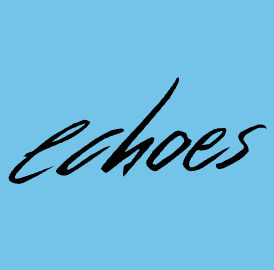
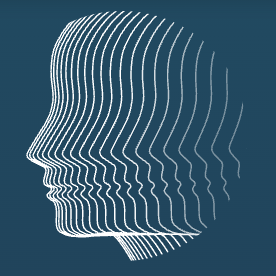

It'll Be Fine
Working with talented students who are eager to learn and love what they do can be a blessing and a curse. When we launched, we assumed we’d pursue producing two games per theme. Then, the first round of game pitches resulted in 20 distinct ideas. The second round, where students pitched at our All Hands meeting, had 11 concepts, all of which were relevant and feasible. Deciding what we had the time & resources to pursue was a difficult meeting for the leadership team.
In the end, we selected four:
- Jelly Beach & Hush began development immediately with fully staffed teams.
- Myth of Change began in a light prototyping mode with a smaller team.
- Kickoff for Dream Swimmer was deferred to Spring 2024 so we could recruit the necessary gameplay programming and 3D modeling expertise.
I think that meeting, when we realized we’d have four games in development by April instead of two, was the first time I heard Sam say, “It’ll be fine.” It took Kendyl shifting to do 2D art for Jelly Beach (before graduating in December), Sam picking up the role of producer in the Spring, bringing on Ben Snyder as creative director, and doubling the GDD and web team sizes, but Sam was right. It was fine.
We ended the year with four solid game prototypes to show off at Imagine RIT, a pilot research project by Will Tallarico , presentations at the VIP Consortium Annual Meeting & the RIT Summer Institute for Teaching and Learning.
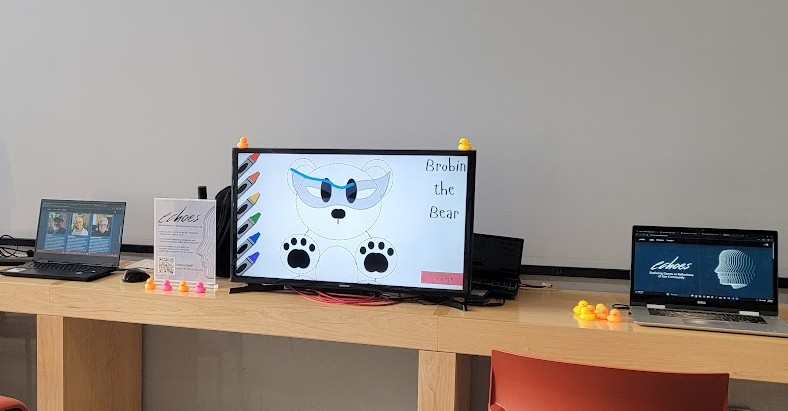
echoes setup at Imagine RIT 2025
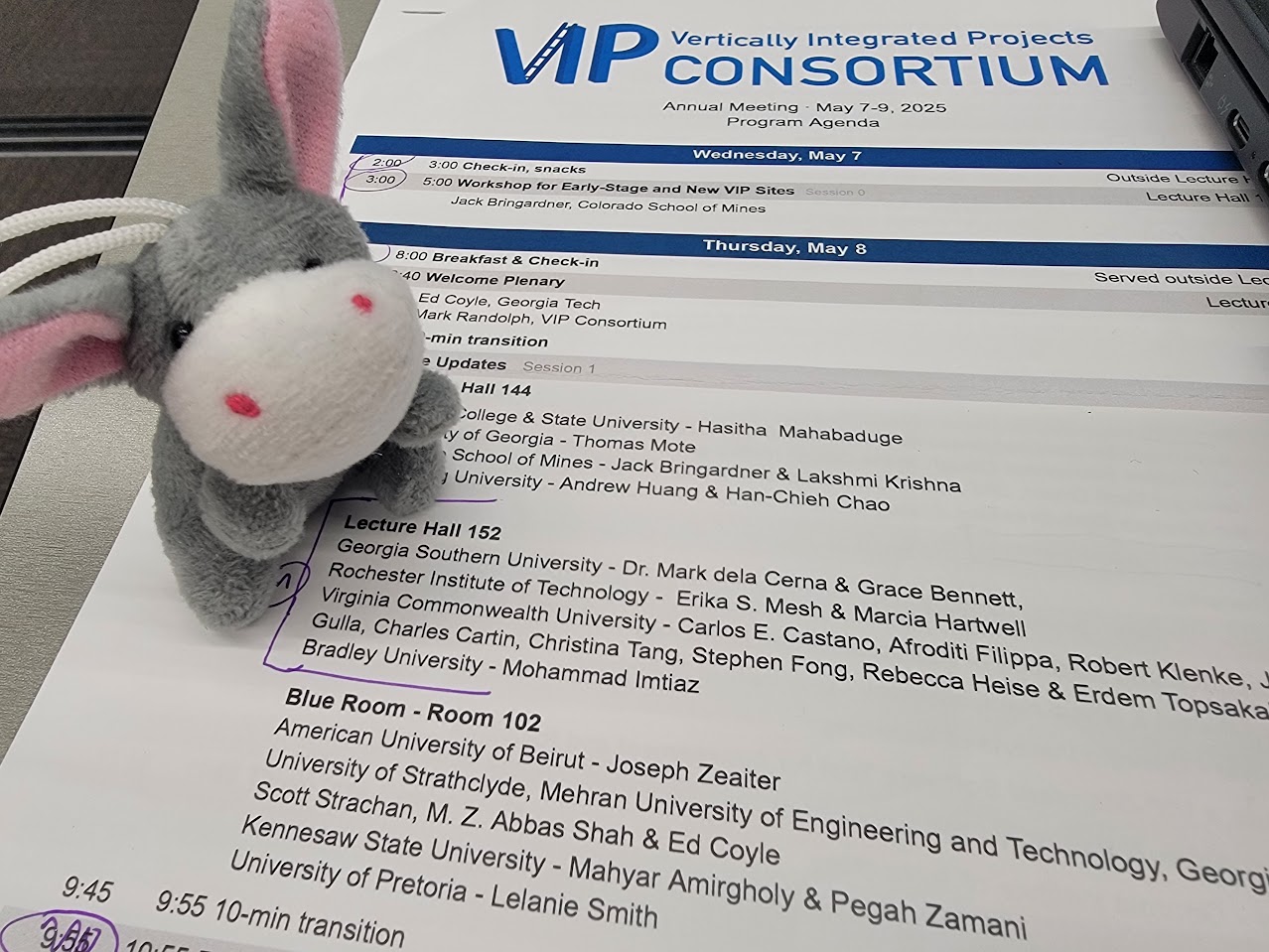
RIT on the program for a site update
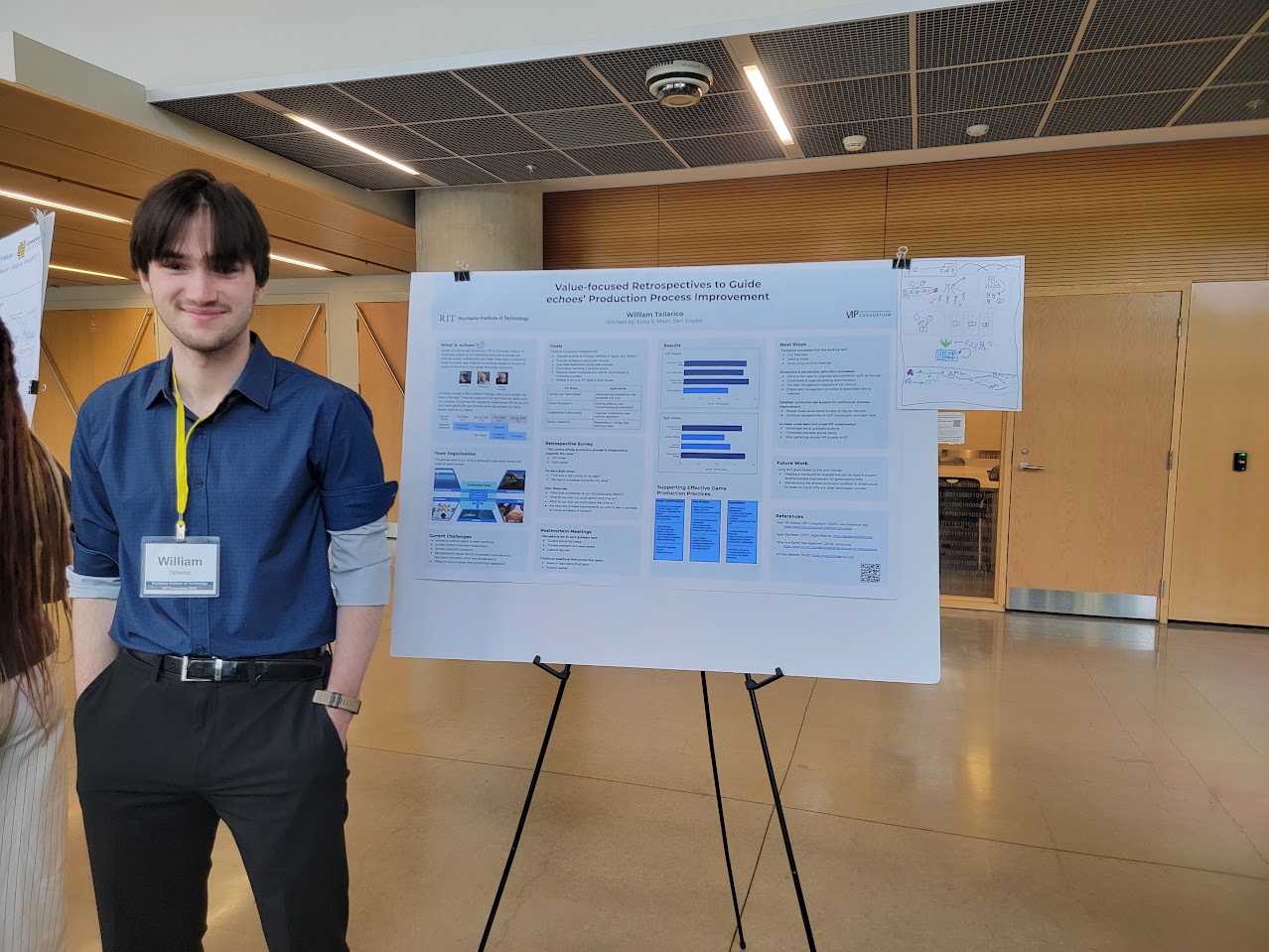
Will Tallarico presenting his research
And I got to watch the first of many echoes students graduate!
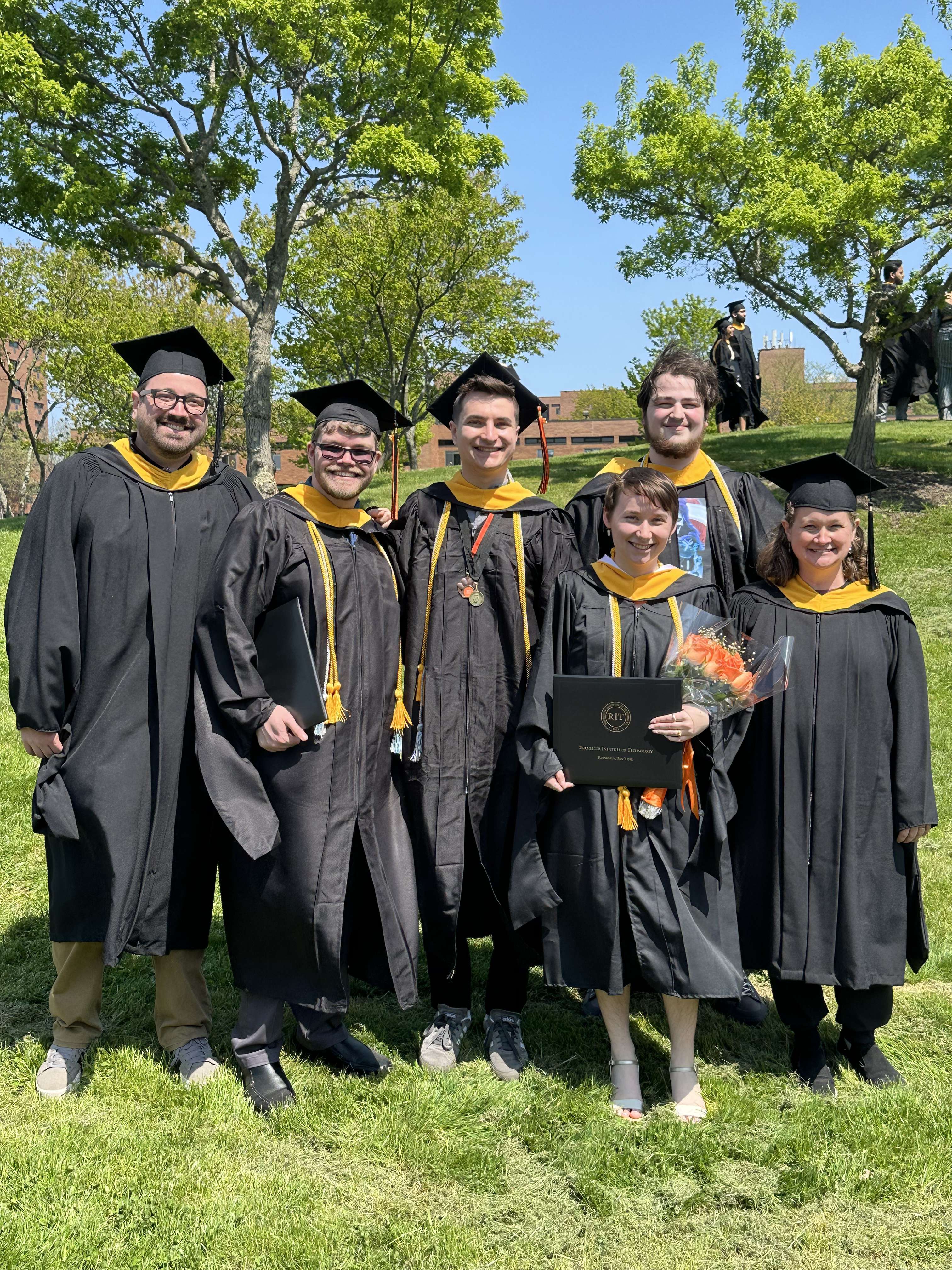
Prof. Snyder, Kevin Insinna, Sam Burgoyne, Carrie Wilson, Lucas Corey, and Prof. Mesh after the 2025 GCCIS Commencement ceremony
Next Steps
With the rapid growth we saw in our first year, the priority now is on solidifying the processes and infrastructure that work well for us while making space to evolve and grow as needed.
- Madison Miller has spent this summer expanding the website to provide much more information (including setting up this blog!)
- Kaitlyn Rodriguez will help present Dream Swimmer at Serious Play next week (look for us in the Arcade too!)
- We’re standardizing our task management & planning processes to make onboarding new team members easier.
- Will is expanding his research to build a reusable instrument to help other faculty & student leads assess and evolve their production processes.
And, of course, we’ll keep making games and meeting new people.
Our goal is for the four Paths of Change games to be released on this website in time for Brick City 2025. We’ll also be launching a new theme this Fall with full production for the new games starting in the spring.
In short, stay tuned. LOTS more to come!
